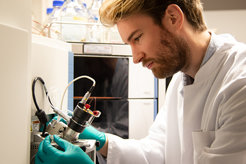From bench to bedside
Working between basic research and translational medicine
Joachim David Steiner works as a postdoc in the department of Adam Antebi as well as a medical doctor in the department of Nephrology. In this interview, Joachim talks about the interface between basic biological research and medical research that he experiences in his jobs.

Joachim, you are working in the fascinating interface of medical research and basic biology. Tell us something about the project you are working on. How does it integrate basic research and “medicine”?
When we refer to what we like to call translational medicine the aim is usually to go from “bench to beside”, i.e. to start with a discovery in basic research that can eventually be applied in patient care. For my project it is kind of the other way around: I acquire samples from patients who undergo cardiac surgery at the University Hospital and are enrolled in a clinical trial. Basically, one part of the cohort is put on a specific diet, whereas the other part receives no intervention. While the clinical trial is interrogating direct health benefits attributable to a balanced diet, in my project we can profit from these samples in trying to understand on a cellular level why a certain diet might be beneficial. Ideally, we could thus understand how an intervention - which is already known to impact individuals from years of collecting patient data - functions mechanistically. Deciphering these mechanisms might then in turn allow us to further improve these interventions.
Tell us a bit about yourself! What is your background and what made you decide to conduct a postdoc in basic research rather than doing pure clinical research or working as medical doctor- and why did you choose ageing as a topic?
Before I decided to become a medical doctor, I had already studied Theoretical Physics intending to do research in that field. Therefore, going into basic research allows me to pursue both of these interests in a way. I still work as medical doctor in the department of Nephrology where I do a few weekend and night shifts. This department also consists of a geriatric ward where many patients with age-related diseases are treated. Thus, I get to see firsthand how severely these diseases can affect the lives of many patients. Moreover, when discussing their symptoms we have to admit regularly that we cannot perfectly explain how they came to suffer from a certain disease and much less how to treat it. Hence, I feel strongly about advancing our knowledge in the ageing field.
The world is facing the consequences of the Covid-19 pandemic. The search for a suitable vaccine, and thus the long road from basic research to medical application, is suddenly moving into the light of public attention. What, in your opinion, are the most challenging parts for the translation from basic research to the clinic?
I’m still at the beginning of both my postdoc in the lab and of my residency in the hospital, so my experience with this is quite limited. However, I believe two of the main challenges are limited time on the one hand and ethical concerns on the other. Firstly, it inevitably takes a long time – often more than a decade – before any discovery made in basic research can be applied in patient care. Thus, patients participating in a trial might not even benefit from these discoveries themselves and physicians might feel that engaging in basic research will not help the patients they are currently treating. This can be observed in the current pandemic where treatment options, such as a successful vaccine, are expected to be discovered almost instantly. Secondly, while in basic research it can suffice to work with a plausible hypothesis, we must be very prudent in ensuring a potential treatment is not harmful before establishing it in clinical practice. Therefore, the requirements for translating any finding made in basic research into clinical practice are rightly so very strict.
From a medical doctor perspective – what do you think are the biggest ageing problems the society is facing currently, or will be facing in the future?
The tremendous progress made in biology and medicine over the last century has led to drastic demographic change. While age-related diseases used to be relatively rare, their prevalence has risen exponentially in recent years. Almost all general practitioners treat numerous elderly people on a regular basis. However, while evidence-based treatment guidelines have been established for diseases such as diabetes or hypertension, they are still lacking for many age-related disorders as they are not as well understood. It will be important to formulate clear strategies, which can be followed in every day routine in dealing with these ailments, rather than relying on personal experience.
What areas of ageing research do you think will - or should - get more in focus in the next years? What area do you think is most promising to generate an approach that can be translated into clinical application?
Even as treatment options are getting more refined, focusing only on ameliorating symptoms might eventually lead to a collapse of the medical system. Hence, I believe we should focus more on prevention which requires a better understanding of the pathogenesis of diseases. I’m likely biased by my own project, but I see the greatest potential in lifestyle changes such as dieting or physical exercise. These are comparatively easy (and cheap) to implement and yield the most striking benefits across a large population. However, for patients to follow such advice it must be based on scientific evidence and not on common beliefs.
A contribution by Miriam Popkes.












